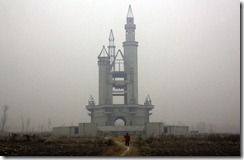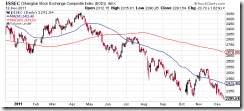``Maybe only a friendly foreigner could say this. But America needs to realize that not everyone can own a home. The American Dream of home ownership for all is a fraud. Politicians who pimped this dream created an unsustainable mortgage industry whose collapse is only surprising because it didn't happen earlier. America's mortgage industry will not recover, nor deserve to recover, unless it is prepared to challenge this politically unpalatable reality.”-Janet Albrechtsen, Columnist The Australian, in Not Everyone Should Own a Home published at the Wall Street Journal
Let us leave the melodramatic chronicling of the market events to the media. Inane comments like “darkest days” and “no idea what will help the market” doesn’t take into account why this event ever occurred. The sun still shines and the market doesn’t need help. In fact, all the help thrown to the market has only worsened the situation by preventing the necessary adjustments.
A humorous depiction of today’s events was poignantly captured by Kal’s Cartoon of the Economist magazine via a caricature which I posted at my blog post Cartoon of the Day: Too Big To Rescue!
As we have repeatedly quoted the warnings of Ludwig von Mises who presciently wrote in 1940s in his magnum opus the Human Action, ``The wavelike movement affecting the economic system, the recurrence of periods of boom which are followed by periods of depression, is the unavoidable outcome of the attempts, repeated again and again, to lower the gross market rate of interest by means of credit expansion. There is no means of avoiding the final collapse of a boom brought about by credit expansion. The alternative is only whether the crisis should come sooner as the result of a voluntary abandonment of further credit expansion, or later as a final and total catastrophe of the currency system involved.”
This has never changed and will be an ongoing dynamic.
Yet it’s not the end of the world as we know it.
In fact, this crisis will unmask the illusions and charades of Keynesian Capitalism-the consumption and paper shuffling economy, -consuming what you don’t produce, spending more than you can afford, taking on debt more than you can pay for, “current account deficits are good” -prompted for by loose monetary policies, the overconfidence from the invincibility of central bank printing press, exports of financial claims in return for real goods or services (paper money standard), government pump priming policies, government’s tweaking with the public’s incentives via the cartelization of the banking system which has led to cronyism and its oligarchic structure which only concentrated risks, the fractional reserve banking system which became paradigm for profiting from credit expansion, and all forms of price control measures to the point of suggesting to suspend the markets. Oh yes, we might not see markets operating next week as this is being discussed as part of the measures to “rescue” the market.
If the ban on short selling only intensified the market’s unraveling, no amount of suspending the market will correct the fundamental imbalances generated by policies meant to perpetuate an eternal boom. Besides, since most of the academe and liberal authorities has pinned the blame on market’s alleged “Greed” (who he/she?), we should then ask our leaders to legislate on controlling human emotions. (e.g. thou shalt not greed!) (hahaha!)
To quote Warren Buffett, ``It's only when the tide goes out that you learn who's been swimming naked." Yes sir, the Emperor has no clothes!
On the hand, we shall see how distinct economies survive this ordeal or the validation or falsification of the new paradigms of: an emerging multipolar world anchored on Emerging Markets (BRIC) and Asia-Emerging Asia (via support from reserve foreign exchange surpluses held or by the shift in demand-supply and saving-investment structures-perhaps via exchange rate policies or by the development phase of financial markets or by increasing regional trade and financial integration and or collaboration)
And this should also test how monetary policy based instruments as interest rates used to cushion today’s market stress will impact distinct economies from which will define each nation’s cost structures as Arthur Middleton Hughes, The recession of 1990: An Austrian explanation of the Austrian School of Economics posits,
``Because of these dissimilarities, changes in the cost of capital result in very different investment patterns. For a lower-stage industry (such as a retailer, wholesaler, or food producer), the cost of capital is not as important, because the interest charges do not have to be carried very long before the payout begins. For a higher-stage industry, increases in the cost of capital often mean the difference between undertaking a new project or not doing it at all… [p.108]
``What this tells us is that the market rate of interest means different things to different segments of the structure of production. When rates go down, a great many higher stage projects that were uneconomic at high interest rates become at once feasible. When rates go up, many higher-stage long-term projects have to be scrapped. These simple rules do not apply to lower-stages of production, simply because their payoff times are much shorter. They don't have to pay as much interest on their typical project. A lower stage producer is less likely to embark on an investment project.” [p110]
Given today’s massive interest rate cutting action conducted jointly by major central banks; particularly the US, ECB, UK, Canada, Sweden, UK, Switzerland, China, Hong Kong and Taiwan, South Korea, what this means is that manufacturing economies stand to benefit from lower interest rates than “consumer related” economies.
So while today’s market has almost gutted most of the global financial markets (equities, commodities, bonds and currencies-yes newspapers focus on stocks but contagion has been across the board) as a result of massive deleveraging and stress in the global banking system, once such policies sink in or diffuse, we are likely to see divergent economic performances that should be reflected on the markets once the panic subsides.


![clip_image001[4] clip_image001[4]](http://lh3.ggpht.com/-ng9uHfRMikc/Tua9-YI_NmI/AAAAAAAAIq8/ziVRfF-PkY0/clip_image001%25255B4%25255D_thumb.png?imgmax=800)